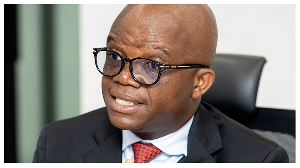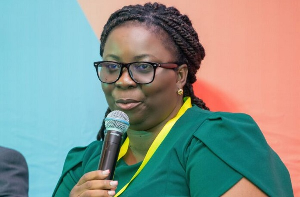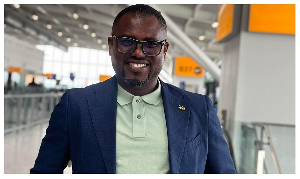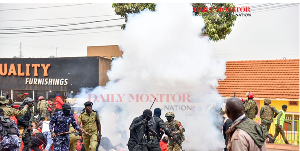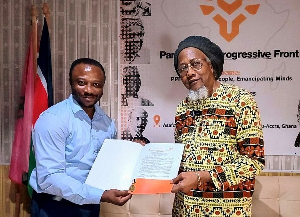Prof. Kofi Awoonor- Conversations with a Literary Mentor!
The sheer moral personality, academic depth, profound spirituality and the soft serenity of Professor Kofi Awoonor greatly belie the wicked, mindless, cowardly violence that slew him in Kenya days ago.
Perhaps I ought to take solace in the explanation offered by his contemporary, another accomplished literary luminary, Professor Kofi Anyidoho, when he described Prof. Awoonor as a reincarnated ancestral warlord who died on the battle field, the reason for the birth scar on his forehead.
If I am privileged to call the great scholar and activist a friend, it is only because he permitted me and not because I played anywhere near his league. Indeed, Professor Kofi Awoonor was a name long before I first met him in person. And when I did, he did not disappoint, confirming my mental imagery. Speaking in soft mellifluous tones with exact enunciation, he chose his words carefully in a flawless word craft that distinguished him as the quintessential poet. The substance of his pronouncements was no less profound. Exuding raw nationalistic fervor, he displayed pained aversion to human suffering and constantly challenged unto the greater good. This was obvious whether in discussing industrial unrests, mindless politicking with a President’s health or reflecting over the essence of a writer’s writings.
Perhaps what I would hold dearest would be our sporadic conversations. I have no choice. They are all I have.
“Are you the young man who has been writing those ‘outrageous’ articles?”, were Prof.’s very first words to me. Shaking his head, he laughed amusedly. He loved the affirmatively disruptive twists and greatly encouraged me to keep soldiering on. Subsequently, we will occasionally ruminate over one feature or the other as published in the Graphic.
Establishing national health screening programs, effective emergency medical services and a structured system for managing Presidential health were passionately discussed with Prof. displaying striking eagerness to move from rhetoric to action.
An article titled “I Love-Hate Your Writing” in which I questioned the essence of the writer spawned another conversation. Many were my questions? Does the writer write to please or does he simply stay true to his convictions? Does the writer avoid potentially controversial topics in the hope of retaining his readership with benign themes? Will the writer ever succeed in pleasing all men at all times?
Prof. Awoonor minced no words. He urged me on. If the writer is to be significant, he ought not to shy from applying his mind to the potentially controversial with some honest, profound and sublime analysis. He then added that he had bitten the bullet many times in his career with certain critics claiming he was “insulting some people. But I didn’t insult anybody!” How could Prof. Awoonor advise otherwise when he himself was guiltier of greater literary crimes, a real provocateur who once stated, “Some of these essays are what I call deliberate provocations to debate. They are to instigate further discourse on the fate of Africa, with the certitude that the fate of our continent is linked up with the fate of all the exploited and abused territories of global poverty and AIDS, a disease which is part of the tools being used to control our population and keep us in perpetual thrall.”
At an airport bookshop earlier this year, I chanced upon the above quotation in Kofi Awoonor’s “African Predicament.” It was a collection of essays. I immediately purchased a copy. Leafing through the contents, I felt a stirring as I read headlines like “Democracy, The Statute of Liberty, Birchers and Communists, Black Culture and African-Americans, Africa and Identity, Why Was Nkrumah Overthrown, Jose Marti: The Pan American Revolutionary 100 Years After His Death, A Socio-Cultural Proposal for African Development, Health and Human Rights Concerns of the South, African Spirituality: The Ewe System As a Sample of West Africa, …”
I called the author immediately, sharing my pride at my latest major acquisition. We agreed that I would read the entire book and then share my reflections with him. We last spoke about three months ago whereupon he invited me home for a chat and a meal. Alas, this was not to be, thanks to Al Shabab! I should have gone. But the reason I did not was because I had not finished consuming, much less digesting “The African Predicament”. How could I meet with the Professor without first reading the book, I surmised, knowing how key its contents would be to the eagerly anticipated conversation? I should have gone. It wouldn’t have mattered that I had not finished reading the book.
I feel drained and empty. I feel like I have lost an opportunity to have become a better person, to have heard something inspirational, to have learnt some national history, to have accomplished something… Lucky Dube’s — life, life, life, is the greatest gift of all— rings so true at this time.
The sun has indeed set in the morning.
Sodzi Sodzi-Tettey
www.sodzisodzi.com
sodzi_tettey@hotmail.com
26th September, 2013
Opinions of Tuesday, 1 October 2013
Columnist: Sodzi-Tettey, Sodzi


